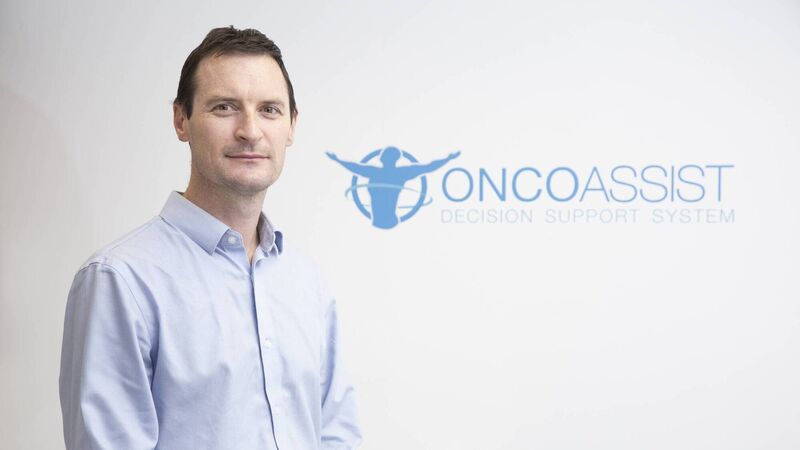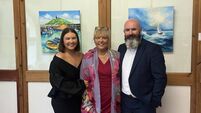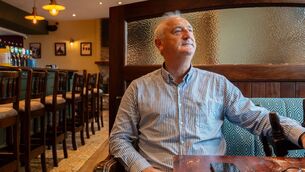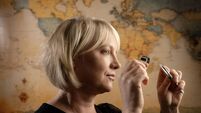Sarcoma lumps: When you should see your GP

Dr Richard Bambury, one of the co-founders of ONCOassist. Picture: Paul Sherwood
Talking to Dr Richard Bambury, Medical Oncologist at Cork University Hospital (CUH), during a recent spell of warm weather, he explained how awareness of sarcoma is crucial.
“While hot weather or sun exposure doesn’t directly affect the development of sarcoma, it can make symptoms like swelling or discomfort in limbs more noticeable, especially if someone has a growing lump or unexplained pain,” says Richard.
“I’d encourage people to be more mindful of any new persistent lumps or aches, and not to dismiss them - especially if they seem to be growing or not going away.”
What exactly is sarcoma and what are symptoms associated with it?
“Sarcoma is a rare form of cancer that arises in the connective tissues -bones, muscles, fat, nerves, and blood vessels. It can occur anywhere in the body but most commonly affects the arms, legs, and abdomen,” says Richard.
“The main symptoms include a painless lump (which may become painful as it grows), swelling, or restricted movement.
Because it is not as well known, people often ignore symptoms or mistake them for sports injuries or benign cysts, which delays diagnosis.
Sarcoma can occur in young and old people, with cases occurring in children, adolescents, young adults, as well as older age groups.
Does Dr Bambury see high instances of sarcoma annually in Munster?
“Sarcoma is relatively rare, accounting for about 1% of adult cancers, so while we don’t see large numbers in Munster annually, we do see constant referrals.
“At Cork University Hospital, we are one of two designated centres for treating soft tissue sarcoma in Ireland, so we often receive patients from across Munster for diagnosis, treatment, or second opinions,” says Richard.
“The other centre for sarcoma treatment in Ireland is St Vincent’s Hospital in Dublin.”
Centralised expertise is important.
“The rarity of the disease and the fact there are more than 50 different subtypes of sarcoma, makes centralised expertise important,” Richard says.
“The sarcoma team at CUH includes pathologists, radiologists, surgeons and oncologists with training and expertise in sarcoma care. There are also dedicated nurse specialists who are critically important team members.”
A large proportion of sarcoma cases occur in adolescents.
“A significant proportion occur in younger adults aged between 16 and 25,” says Richard.
“As a designated national Adolescent Young Adult (AYA) cancer centre, these patients can benefit from specialised medical nursing, social work and mental health (psycho-oncology) support specific to their age group at CUH.”
How is sarcoma treated and what are the survival rates?
“Treatment usually involves surgery to remove the tumour,” says Richard.
“Radiotherapy is often given before or after surgery. Chemotherapy, targeted therapy or immunotherapy may have a role to play depending on the type size and location of sarcoma. Advances in limb-sparing surgery, targeted therapy, and multi-disciplinary care have greatly improved outcomes. Survival rates vary depending on when it’s caught - early diagnosis makes a big difference.
“For localised soft tissue sarcoma, the five- year survival rate is around 75%. But for more advanced disease, the rates drop significantly, highlighting the need for early detection and specialist care.”
Richard, a medical expert in oncology, has travelled widely.
“I graduated from UCC medical school in 2004 and pursued post-graduate training in Cork, Australia, Dublin, and New York before returning to work as a consultant in my home town of Cork.”
Was he always interested in cancer medicine? “I was interested in cancer medicine from an early age,” Richard says.
“The continuously evolving scientific advances make it an exciting field to work in. There are tangible changes and improvements every year.
“I enjoy working on clinical trials of new cancer medicines and we have a large and growing clinical trials team to bring new cutting- edge treatment options to patients while they are still in development.”
It is true that cancer has affected families everywhere.
“Cancer remains the most common cause of death in Ireland,” says Richard.
“It is a privilege to care for and witness the bravery of patients and their families as they face this potentially devastating illness.”
Why are cancer rates rising?
“Cancer rates continue to rise in Cork and Munster due to a growing and aging population,” says Richard.
“For oncology in CUH, the area we need to focus on in the coming years is cancer care infrastructure such as in-patient beds and day care space so that we can meet that demand.”
Richard believes in technology.
“I am a great believer in the power of technology to improve healthcare delivery,” he says.
“I am co-founder of ONCOassist which is an oncology decision support software tool that was spun out through the UCC Ignite start-up programme.”
He says raising awareness is vital.
“Just to stress that sarcoma often gets overlooked, so raising public awareness is vital. If someone notices an unusual lump, especially one that is growing, firm, or deep-seated-even if its’ painless - they should see their GP,” says Richard.
“Early detection and referral to a sarcoma centre can make all the difference.”
With a responsible role in the medical profession that he is “privileged to have”, how does Richard relax in his spare time?
“I enjoy playing soccer with the Cork Hospitals team in the Cork Business League,” says Richard.
“I was part of the Irish Medical Football team that won the World Medical Football Championships in Vienna in 2023.”
That was some achievement.
“It was,” says Richard smiling.
“In this year’s tournament that was held in Dublin, we progressed to the final after beating Argentina in the quarter finals and then Germany in the semi-finals.
“Unfortunately, we were narrowly beaten in the final on penalties by team GB!”
The cancer care team at CUH has also achieved great things.
“The cancer care team at Cork University Hospital were proud to attain OECI Cancer Centre status earlier this year, in partnership with UCC, as the CUH/UCC Cancer Centre,” says Richard.
What does this signify?
“This signifies that the institution meets high European standards for comprehensive cancer care, research and education.”







 App?
App?


